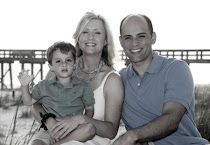 One of my childhood friends (mother of 3 under 9) introduced me to the parenting principles and theories of Love and Logic. She has attended seminars, bought books and is really enjoyed the benefits of using these simple skills with her children. What caught my ear was when she explained to me...."if you think about it... as a parent what you are doing is trying your best to raise responsible adults."Wow! That makes complete sense. There are classes for us to take to learn how to paint, to take pictures, to cook, why not just one really good class to teach us how to be the best parents we can be? Parenting with Love and Logic IS the class.The best part of this program is that it has been around since 1977 and it's pretty easy to find facilitators in your area who are putting on seminars for parents and teachers. Check with your child's school to see if they hold seminars. You can also check out the website to see if Jim Fay (founder) and his son Dr. Charles Fay are coming to a city near you. I was lucky enough to attend a 1/2 day course, hosted by a local church this past February. Easily I can say that was the most well spent 6 hours I have ever spent learning something! The most important takeaway for me was to stop telling my son what to do. It's a rut we fall into because it's the way were were parented. When you constantly tell your children what to do, they tune you out and never learn to think for themselves. This was another light bulb moment for me. What's the answer? in short, to offer them choices. This is better explained by reading the following "Insider's Club" email I received in my in-box yesterday. This basic principle and tactic is the one I use mainly and have seen tremendous results with my 4 year old son. The Power of the Enforceable Statement
One of my childhood friends (mother of 3 under 9) introduced me to the parenting principles and theories of Love and Logic. She has attended seminars, bought books and is really enjoyed the benefits of using these simple skills with her children. What caught my ear was when she explained to me...."if you think about it... as a parent what you are doing is trying your best to raise responsible adults."Wow! That makes complete sense. There are classes for us to take to learn how to paint, to take pictures, to cook, why not just one really good class to teach us how to be the best parents we can be? Parenting with Love and Logic IS the class.The best part of this program is that it has been around since 1977 and it's pretty easy to find facilitators in your area who are putting on seminars for parents and teachers. Check with your child's school to see if they hold seminars. You can also check out the website to see if Jim Fay (founder) and his son Dr. Charles Fay are coming to a city near you. I was lucky enough to attend a 1/2 day course, hosted by a local church this past February. Easily I can say that was the most well spent 6 hours I have ever spent learning something! The most important takeaway for me was to stop telling my son what to do. It's a rut we fall into because it's the way were were parented. When you constantly tell your children what to do, they tune you out and never learn to think for themselves. This was another light bulb moment for me. What's the answer? in short, to offer them choices. This is better explained by reading the following "Insider's Club" email I received in my in-box yesterday. This basic principle and tactic is the one I use mainly and have seen tremendous results with my 4 year old son. The Power of the Enforceable Statement  |
Dear Insider Club Member,
There are a number of people, probably not very many, who enjoy being ordered to do things. Somehow it just seems to rankle quite a few of us to be told what to do. So, when we are told to shut up, we tend to talk more. Telling kids to hurry up is usually followed by our having to compare them to stationary objects to see if they are actually moving.
This quirk of human nature was researched by Dr. Raymond Wlodkowski. He found that when we are ordered to do something, we subconsciously sense a loss of personal control. This is increased if a threat is stated with the order such as, "If you don't eat your peas, you are not going to get dessert." We've all seen the results of this kind of threat. The situation usually goes down hill rapidly. What was once a happy mealtime becomes the scene of a power struggle as both the adult and child try to regain control.
Dr. Wlodkowski's Threat Cycle research led us to develop the technique called Enforceable Statements. We found that when kids tell themselves the possible threat there is far less resistance. When a child hears the parent say, "I'll be serving dessert to everyone who eats peas." The youngster can say to himself, "Uh oh, I might not get dessert," but doesn't readily identify the threat as coming from the adult. The result? Odds for cooperation increase. Odds for arguing go down.
Thanks for reading,
Jim Fay
_____________________________
If you want to subscribe to the FREE Insider's Club, click here. You will get weekly insights such as this. So helpful! Also become a fan on Facebook here. Request a catalog of books

























































































